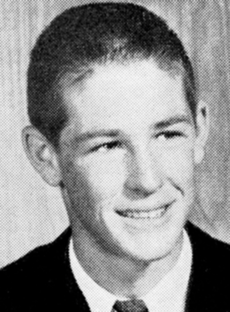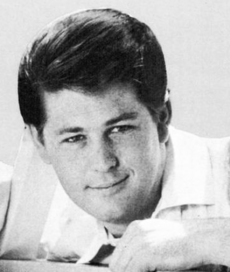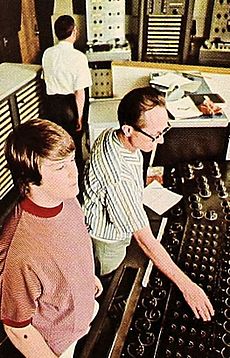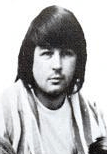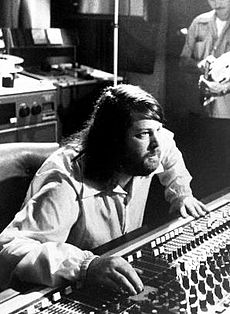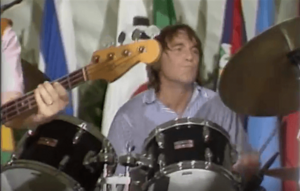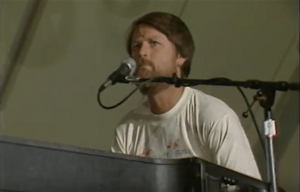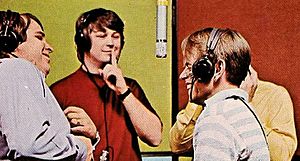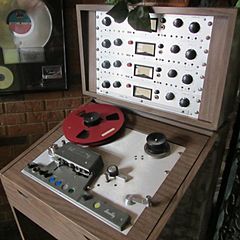Brian Wilson facts for kids
Quick facts for kids
Brian Wilson
|
|
|---|---|
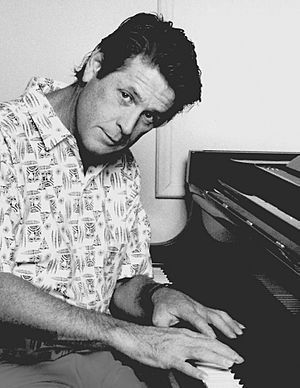
Wilson in 1990
|
|
| Born |
Brian Douglas Wilson
June 20, 1942 Inglewood, California, U.S.
|
| Died | June 11, 2025 (aged 82) |
| Occupation |
|
| Years active | 1961–2024 |
| Spouse(s) |
|
| Children |
|
| Parent(s) |
|
| Relatives |
|
| Musical career | |
| Origin | Hawthorne, California, U.S. |
| Genres |
|
| Instruments |
|
| Labels | |
| Signature | |
Brian Douglas Wilson (June 20, 1942 – June 11, 2025) was an American musician, songwriter, singer, and record producer. He helped start the Beach Boys and became known as one of the most creative and important music figures of his time. His music was special because of its amazing production, complex harmonies, layered vocals, and thoughtful themes. He was also known for his strong head voice and falsetto singing.
Wilson was inspired by artists like George Gershwin, the Four Freshmen, Phil Spector, and Burt Bacharach. In 1961, he began his music career with the Beach Boys. He wrote songs, produced music, sang, played bass guitar and keyboards, and was the band's main leader. After signing with Capitol Records in 1962, he became one of the first pop musicians to write, arrange, produce, and perform his own songs. He also produced music for other groups like the Honeys and American Spring. By the mid-1960s, he had written or co-written over twenty U.S. Top 40 hits. These included number-one songs like "Surf City" (1963), "I Get Around" (1964), "Help Me, Rhonda" (1965), and "Good Vibrations" (1966). He is seen as one of the first rock producers to use the recording studio as an instrument.
Wilson faced health challenges throughout his life. He had a nervous breakdown in late 1964 and stopped touring regularly to focus on writing and producing music. This led to more complex songs and albums, such as the Beach Boys' Pet Sounds and his first solo song, "Caroline, No" (both 1966). He also worked on the unfinished album Smile. By the late 1960s, his health and ability to create music declined. He spent time alone and struggled with his well-being. His first big return to music was with The Beach Boys Love You (1977). In the 1980s, he started his solo career again with the album Brian Wilson (1988). Wilson toured regularly from 1999 to 2022. He finished a version of Smile in 2004, which brought him great praise as a solo artist. He passed away in 2025 due to breathing problems.
Wilson's achievements helped popular music be seen as an art form. He influenced many music styles, including the California sound, art pop, psychedelia, chamber pop, progressive music, punk, and sunshine pop. His influence also reached post-punk, indie rock, emo, dream pop, Shibuya-kei, and chillwave. He won many awards, including two Grammy Awards and Kennedy Center Honors. He was inducted into the Rock and Roll Hall of Fame in 1988 and the Songwriters Hall of Fame in 2000. His life story was told in the 2014 movie Love and Mercy.
Contents
- Early Life and Musical Beginnings
- Music Career
- Forming the Beach Boys (1961–1962)
- Early Productions and Solo Work (1962–1963)
- International Success and Stepping Back from Touring (1964–1965)
- Artistic Growth and Pet Sounds (1965–1966)
- "Good Vibrations", Smile, and Home Studio (1966–1968)
- Reduced Activity and Health Struggles (1968–1975)
- Health Support and Return to Music (1975–1982)
- Second Health Intervention and Solo Career (1982–1991)
- Career Resurgence and Solo Tours (1992–2011)
- Later Years and Final Performances (2011–2025)
- Death and Tributes
- Musical Influences
- Artistry
- Health and Personal Life
- Personal Life
- Cultural Impact and Influence
- Documentary Films
- Awards and Honors
- Discography
- Filmography
- See also
Early Life and Musical Beginnings
Brian Douglas Wilson was born on June 20, 1942, in Inglewood, California. He was the first child of Audree Neva and Murry Wilson. Murry was a machinist who also wrote songs part-time. Brian's younger brothers, Dennis and Carl, were born in 1944 and 1946. The family moved to Hawthorne, California, shortly after Dennis was born.
From a young age, Brian showed a natural talent for music. His father remembered how Brian could play a song's melody after hearing it only a few times. Murry encouraged his children's musical talents. Brian took accordion lessons and sang solos in church choirs. His choir director said he had perfect pitch, meaning he could identify any musical note just by hearing it. Brian listened to radio stations and learned about R&B music from his brother Carl and uncle Charlie.
One of Brian's first attempts at songwriting was when he was nine. He changed the words to an old song called "Oh! Susannah". When he was 12, his family got a piano, and he spent hours teaching himself to play his favorite songs. He learned how to write music notes from a friend of his father. Brian sang with friends at school and with family at home. He helped his brothers learn harmony parts, and they would practice together. He also studied the harmonies of the Four Freshmen by listening to their songs and trying to play them on the piano.
In high school, Brian played quarterback on the football team and ran cross-country. He also had a part-time job sweeping at a jewelry store. For his 16th birthday, he received a tape recorder. This allowed him to experiment with recording songs and group vocals. His high school music teacher noticed his talent for learning classical music. In 1959, Brian wrote an essay saying his dream was to "make a name for myself [...] in music."
One of Brian's first public performances was at a high school arts program. He sang with his cousin Mike Love and his brother Carl. They called their group "Carl and the Passions" and performed songs by Dion and the Belmonts and the Four Freshmen. Their performance impressed a classmate named Al Jardine.
In September 1960, Brian started college, studying psychology and music. He left college after about 18 months because he was disappointed that his teachers didn't appreciate pop music. He said he wrote his first completely original song, "Surfer Girl", in 1961.
Music Career
Forming the Beach Boys (1961–1962)
Brian, his two brothers, Mike Love, and Al Jardine formed their first music group, "the Pendletones," in the fall of 1961. Brian and Mike Love wrote their first song, "Surfin'", after Dennis suggested they write a song about surfing. Brian's father, Murry, became their manager.
"Surfin'" became a hit in Los Angeles and reached number 75 on the national Billboard charts. The record company, Candix Records, changed the group's name to the Beach Boys. Their first big live show was on New Year's Eve, 1961. Just before that, Brian got an electric bass from his father and quickly learned to play it.
When Candix Records had money problems, Murry ended their contract. Brian then worked with musician Gary Usher to make demo recordings for new songs like "409" and "Surfin' Safari". Capitol Records decided to release these demos as a single, and it became a national hit.
Early Productions and Solo Work (1962–1963)
In 1962, Brian and the Beach Boys signed a seven-year contract with Capitol Records. Brian convinced Capitol to let the band record their music outside the label's own studios, which he felt were not right for their sound. He also gained control over producing their first album, Surfin' Safari, even though he wasn't officially credited for it.
Brian was inspired by producer Phil Spector. He wanted to be a producer who worked behind the scenes. Brian wrote many songs with Gary Usher and produced records for local artists. His first production outside the Beach Boys was "The Revo-Lution" by Rachel and the Revolvers. Brian's father later caused problems that ended his partnership with Usher. In October 1962, a label started by Murry released "The Surfer Moon" by Bob & Sheri, which was the first record to officially credit Brian as producer.
From January to March 1963, Brian produced the Beach Boys' second album, Surfin' U.S.A.. He limited his public appearances with the band to focus on studio work. In March, Capitol released "Surfin' U.S.A.", which became the Beach Boys' first top-ten song. The album reached number two on the Billboard charts, making the Beach Boys a very popular group. Brian also worked with other artists, like the duo Jan and Dean. He co-wrote "Surf City" with Jan Berry, which became a number-one hit in July 1963. This song helped Jan and Dean's career. Capitol and Brian's father did not approve of this collaboration.
Around this time, Brian started producing music for the Rovell Sisters, a girl group that included Marilyn and Diane Rovell. Brian became close to the Rovell family and lived with them for a while.
Brian was first officially credited as the Beach Boys' producer on their album Surfer Girl, released in September 1963. This album also did very well. He also produced the car-themed album Little Deuce Coupe shortly after. By the end of 1963, Brian had written, arranged, or produced 42 songs for other artists.
International Success and Stepping Back from Touring (1964–1965)
In 1964, Brian toured internationally with the Beach Boys while also writing and producing their albums Shut Down Volume 2, All Summer Long, and The Beach Boys' Christmas Album. After a difficult tour, the group decided to remove Murry as their manager.
When Beatlemania became popular in the U.S. in February, Brian felt that the Beach Boys' success was threatened. He said, "The Beatles invasion shook me up a lot. [...] So we stepped on the gas a little bit." The Beach Boys' song "I Get Around" became their first U.S. number-one hit in May 1964. This song showed their response to the British Invasion and started a friendly competition between Brian and the Beatles.
By late 1964, Brian felt a lot of pressure from his career. He started to move away from the surf-themed music. He felt tired from doing "Mr. Everything" for the band.

On December 23, 1964, Brian was supposed to go on a two-week tour, but he had a difficult moment during a flight due to stress. He played the show that day but was replaced by musician Glen Campbell for the rest of the tour. This was the first time Brian had missed concerts with the Beach Boys since 1963. He later described it as "the first of a series of three breakdowns." When the group started recording their next album in January 1965, Brian decided he would stop touring in the future.
Campbell filled in for Brian on tour until February 1965. After that, Bruce Johnston was hired as Brian's permanent replacement for touring.
Artistic Growth and Pet Sounds (1965–1966)
With his bandmates often on tour, Brian became more distant from the Beach Boys. By late 1964, he had moved to an apartment in Hollywood and started making new friends in the music industry. This was a time when Brian gained more independence. He became friends with talent agent Loren Schwartz, who introduced him to new ideas and literature.

Throughout 1965, Brian's musical ideas grew significantly with the albums The Beach Boys Today! and Summer Days (And Summer Nights!!). Brian later said that during this time, he composed parts of the Beach Boys' song "California Girls". He called the recording session for the song's music his "favorite" and the opening part "the greatest piece of music that I've ever written."
Brian and his wife Marilyn moved into a new home in Beverly Hills in late 1965. Brian felt a burst of creativity there, working for hours on new music ideas. Over five months, he planned an album that would take his music to a "spiritual level."
In December 1965, Brian asked jingle writer Tony Asher to write lyrics for the Beach Boys' next album, Pet Sounds (released May 1966). Brian produced most of the album between January and April 1966. He mainly used his bandmates for singing and session musicians for the music. Brian said the instrumental song "Let's Go Away for Awhile" was his "most satisfying piece of music" at the time. He also called "I Just Wasn't Made for These Times" a song about feeling different. In a 1995 interview, he called "Caroline, No" "probably the best [song] I've ever written."
The album's first song, "Caroline, No", released in March 1966, was Brian's first solo song. This made people wonder if he would leave the Beach Boys. The song reached number 32, and Pet Sounds reached number 10. Brian was disappointed that his artistic growth didn't lead to a number-one album.
"Good Vibrations", Smile, and Home Studio (1966–1968)
Brian met Derek Taylor, who used to work for the Beatles. Taylor became the Beach Boys' publicist in 1966 and helped promote Brian as a "genius." This helped Pet Sounds become very popular in the UK. However, Brian later felt that the "genius" label created too many expectations for his work. His bandmates also felt that the media focused too much on Brian, overshadowing the group's efforts.
In late 1966, Brian worked a lot on the Beach Boys' song "Good Vibrations", which became a number-one hit in the U.S. in December. He also started working with musician Van Dyke Parks on Smile, which was planned to be the next album after Pet Sounds. Brian called Smile a "teenage symphony to God."

Smile was never finished, partly because Brian's health worsened. In April 1967, Brian and his wife moved to a new house in Bel Air. There, Brian started building his own home studio.
In May, Derek Taylor announced that Smile had been "scrapped." Brian explained in 1968, "We pulled out [...] because I was about ready to die. I was trying so hard." That July, the Beach Boys released "Heroes and Villains" as a song. Its mixed success affected Brian's spirits. He later said that keeping his reputation in the music industry was "a really big thing for me."
Starting with Smiley Smile (September 1967), the band began recording at Brian's home studio. This album was the first time production was credited to the whole group instead of just Brian. In August 1967, Brian briefly joined the band for two live shows in Honolulu.
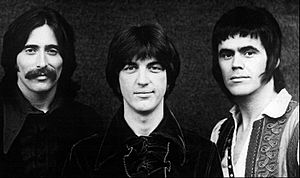
During sessions for Wild Honey (December 1967), Brian encouraged his brother Carl to contribute more. He also started producing songs for Danny Hutton's group Redwood, but the project was stopped by Carl and Mike Love, who wanted Brian to focus on the Beach Boys. The band's June 1968 album Friends was made during a time when Brian was recovering emotionally. Brian later called Friends his second "solo album" and his favorite Beach Boys album.
Reduced Activity and Health Struggles (1968–1975)
For the rest of 1968, Brian wrote fewer songs and his emotional state declined. He struggled with his health. His cousin Steve Korthof and associate Arny Geller opened a health food store called the Radiant Radish with Brian in July 1969.
In August 1969, the Beach Boys' music publishing company sold their song catalog. Brian signed the agreement under pressure from his father. His wife Marilyn later said that this sale deeply saddened him. During this time, Brian wrote "'Til I Die", which he later called a summary of his feelings at the time.
Later in 1969, Brian produced a spoken-word album for poet Stephen Kalinich. In November, the Beach Boys signed with Reprise Records, which required Brian to be actively involved in their albums. In March 1970, Brian briefly filled in for Mike Love on tour. In April, he tried to produce a country and western album.
Brian was disappointed by how Sunflower sold, which led him to contribute less to later Beach Boys recordings. In November 1970, Brian performed with the band at the Whisky a Go Go. He felt uncomfortable and had to leave during the second show. He later told a magazine that he was "quite happy living at home" but felt less creative. In September 1971, Brian said he was focusing more on arranging music than writing. In December, he briefly joined the Beach Boys on stage at a concert.
From late 1971 to early 1972, Brian worked with musician David Sandler on Spring, the first album by Marilyn Wilson and Diane Rovell's new group, American Spring. This was his most involved production since Friends in 1968. During the recording of Carl and the Passions (April 1972), Brian rarely left his bedroom, but when he did, his contributions were amazing.
In the summer of 1972, Brian joined his bandmates in Holland. He was inspired to write a fairy tale, Mount Vernon and Fairway, based on childhood memories. The group decided not to include the fairy tale on their next album, Holland, but released it as a bonus record with the album.
A Time of Retreat
After his father passed away in June 1973, Brian spent a lot of time alone at home. He struggled with his health and well-being. He rarely went outside and later said his father's death "had a lot to do with my retreating." Brian's family eventually had to take control of his money because of his spending. This sometimes led Brian to wander around the city, looking for rides or help.
Brian's music output was very small from 1974 to 1975 because he found it hard to focus. He spent time with friends like Danny Hutton. Many stories about Brian from the early 1970s became well-known, even if they weren't always true.
The Beach Boys' greatest hits album Endless Summer was a big success in October 1974. To build on this popularity, Brian agreed to join his bandmates in Colorado to record a new album. They completed a few songs, including "Child of Winter (Christmas Song)". This was their first record since 1966 to credit Brian as producer.
In early 1975, Brian signed a short-term production deal with Bruce Johnston and Terry Melcher. They formed a group called California Music. Brian's production of California Music's song "Why Do Fools Fall in Love" was his only "serious" work during this time.
Health Support and Return to Music (1975–1982)
Brian's health struggles put a strain on his marriage to Marilyn. In 1975, to help him, the band's manager appointed Brian's cousin, Stan, a basketball player, as his caretaker. Brian's family and the band's lawyers held a meeting to remind him of his contract to write and produce for the Beach Boys. Stan helped Brian improve his health for several months. Brian then entered a special therapy program in October.
Under this care, Brian became more stable and social, and he started creating music again. In 1976, the phrase "Brian's Back!" was used to promote the Beach Boys' concerts and the album 15 Big Ones, released in July. This was the first album since Pet Sounds to list Brian as the only producer.
Starting on July 2, 1976, Brian began performing regularly with the band again for the first time since 1964. He sang and played bass guitar and piano. In August, he toured outside California for the first time since 1970. NBC aired a TV special about the Beach Boys, featuring concert footage and interviews with Brian. Despite the success of "Brian's Back!", some people felt Brian had not fully recovered.
From October 1976 to January 1977, Brian produced many songs on his own. Released in April 1977, The Beach Boys Love You was the first Beach Boys album where Brian was the main songwriter since Wild Honey in 1967. Brian played almost every instrument on the album. In a 1998 interview, Brian said 15 Big Ones and Love You were his two favorite Beach Boys albums.
Hospital Stays and Challenges
In early 1977, Brian produced Adult/Child, but some bandmates had concerns, so it was not released. In March, the Beach Boys signed with CBS Records, and their contract required Brian to write most of the songs for future albums. Brian found this prospect difficult. He described having a "mental blank-out" during the sessions for M.I.U. Album (October 1978).
After a difficult tour in Australia in 1978, Brian's health declined again. In mid-1978, after a health incident, he ended up in Mexico and then San Diego, where police found him. He was taken to a hospital to recover. Brian rejoined his bandmates for the recording of L.A. (Light Album) (March 1979), but he asked Bruce Johnston to take over the project.
As his marriage ended, Brian moved to a smaller home where his health struggles worsened. After an incident with his doctor, he was admitted to Brotzman Memorial Hospital. He was released in March 1979 and moved to a house in Santa Monica, where he was cared for by a team of nurses. He later bought a home in Pacific Palisades. Although his bandmates wanted him to produce their next album, Keepin' the Summer Alive (March 1980), he was unable to do so.
Brian continued to struggle with his health. His brother Dennis sometimes helped him with music projects. Unreleased recordings of the brothers' collaborations from 1980 and 1981 became known among fans as the "hamburger sessions."
In early 1982, Brian signed a document giving Carl control of his money and voting power in the band. He was also admitted to St. John's Hospital in Santa Monica for three days. By the end of the year, his weight had increased significantly.
Second Health Intervention and Solo Career (1982–1991)
In 1982, after another health incident, Brian's family convinced him to re-enter a special health program. He was told he was struggling financially and needed to rejoin the program to continue receiving income. Brian agreed and was taken to Hawaii, where he was isolated from friends and family and placed on a strict health plan. This treatment helped restore his physical health. By March 1983, he returned to Los Angeles and lived in a Malibu home with several aides, cut off from many of his friends and family.
As Brian recovered, he participated in recording The Beach Boys (June 1985), which was promoted as his "comeback." He then focused on a solo career. In 1986, he worked with former collaborator Gary Usher, producing about a dozen songs. One song, "Let's Go to Heaven in My Car", appeared on the Police Academy 3 (1986) soundtrack.
Brian occasionally performed with his bandmates and played his first solo concerts at charity events. In January 1987, he signed a solo contract with Sire Records. His first solo album, Brian Wilson, was released in July 1988. It received good reviews and sold moderately well. The album featured "Rio Grande", an eight-minute Western-style song.
In 1989, Brian formed a company called Brains and Genius. He worked on his second solo album, Sweet Insanity, but the record company rejected it. In May 1989, Brian recorded "Daddy's Little Girl" for the film She's Out of Control.
By 1990, Brian was distant from the Beach Boys. His bandmates scheduled recording sessions without him and twice turned down his offers to produce an album. After a legal action by his family in May 1991, Brian's partnership with his psychologist ended in December.
Career Resurgence and Solo Tours (1992–2011)
Legal Matters and New Music
Throughout the 1990s, Brian was involved in many legal cases. In August 1989, he filed a lawsuit to get back song publishing rights that his father had sold years earlier. He didn't get the rights back but received a large settlement in April 1992. The next month, Mike Love sued Brian over unpaid royalties and songwriting credits. In December 1994, a jury ruled in favor of Love, awarding him money and a share of future royalties. When Brian married his second wife, Melinda, in 1995, he was involved in nine separate lawsuits.
Brian's ability to create music increased significantly after he was no longer under strict supervision. He and Andy Paley wrote and recorded many songs for a possible Beach Boys album in the early to mid-1990s. Brian also worked with musician Don Was on the documentary Brian Wilson: I Just Wasn't Made for These Times (1995). The soundtrack, which included re-recorded Beach Boys songs, was released as his second solo album.
In 1993, Brian recorded an album of songs by Van Dyke Parks, released as Orange Crate Art in October 1995. In the late 1990s, Brian and Tony Asher started writing together again. One of their songs, "Everything I Need," appeared on The Wilsons (1997), an album by his daughters Carnie and Wendy.
Imagination and the Brian Wilson Band
The Brian Wilson–Paley project was eventually stopped. Instead, Brian co-produced the Beach Boys' 1996 album Stars and Stripes Vol. 1 with Joe Thomas. In 1997, Brian moved to Illinois to work on a solo project with Thomas. His third solo album, Imagination (June 1998), reached number 88 in the U.S. and received some criticism for its sound. Shortly before the album's release, Brian lost his brother Carl and their mother Audree.
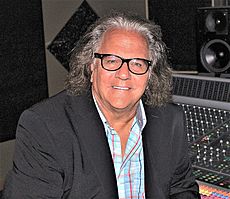
From March to July 1999, Brian went on his first solo tour, playing shows in the U.S. and Japan. His band included former Beach Boys musician Jeff Foskett and members of Wondermints. He toured the U.S. again in October. In 2000, he said, "I feel much more comfortable on stage now. I have a good band behind me."
In August 1999, Brian filed a lawsuit against Thomas, seeking to work on his next album without Thomas's involvement. Thomas counter-sued, and the case was settled out of court.
Live Albums and Brian Wilson Presents Smile
In early 2000, Brian released his first live album, Live at the Roxy Theatre. Later that year, he toured the U.S., performing Pet Sounds live with a 55-piece orchestra. Critics praised the tour, but it did not attract many attendees. In March 2001, Brian attended a tribute show in his honor in New York, where he performed "Heroes and Villains" publicly for the first time in decades.
The Pet Sounds tour continued in Europe in 2002, with sold-out shows in London. Recordings from these concerts were released as the live album Brian Wilson Presents Pet Sounds Live (June 2002). Over the next year, Brian continued recording for his fourth solo album, Gettin' In over My Head. Released in June 2004, the album featured guest artists like Van Dyke Parks, Paul McCartney, Eric Clapton, and Elton John.

Brian surprised many by agreeing to tour with songs from the unfinished Smile album. Brian Wilson Presents Smile (BWPS) premiered in London in February 2004. Its positive reception led to a studio album version. Released in September, BWPS reached number 13 on the Billboard 200, which was the highest chart position for any Beach Boys or Brian Wilson album since 1976. It later became a platinum-selling album.
To support BWPS, Brian toured the U.S., Europe, and Japan. In July 2005, Brian performed at the Live 8 concert in Berlin. In September, he organized a charity event for Hurricane Katrina victims, raising over $250,000. In November, Mike Love filed a lawsuit, which was later dismissed.
Covers Albums and That Lucky Old Sun
In October 2005, Arista Records released Brian's album What I Really Want for Christmas, which included two new original songs. To celebrate the 40th anniversary of Pet Sounds, he briefly toured the album in November 2006 with Al Jardine. In 2007, Brian was asked to create a new song cycle (a group of songs that tell a story or have a common theme). Working with Scott Bennett, Brian created That Lucky Old Sun, a semi-autobiographical work about California. A studio version was released as his seventh solo album in September 2008 and received good reviews.
In 2009, Walt Disney Records asked Brian to record an album of Disney songs. He agreed, but only if he could also record an album of George Gershwin songs. The Gershwin project, Brian Wilson Reimagines Gershwin, was released in August 2010. It reached number 26 on the Billboard 200 and topped the Jazz Albums chart. Brian then toured, performing the entire album. In October 2011, he released In the Key of Disney, which reached number 83 in the U.S. This release was soon followed by The Smile Sessions, released one week later.
Later Years and Final Performances (2011–2025)
Beach Boys Reunion and Biopic
In mid-2011, Brian reunited with Mike Love, Al Jardine, David Marks, and Bruce Johnston to re-record "Do It Again" for a possible 50th anniversary album. Rumors spread about a world tour. Brian eventually agreed to the tour, which lasted until September 2012, and to record the album That's Why God Made the Radio, released in June 2012.
In September 2014, Brian attended the premiere of the movie Love & Mercy, which tells his life story. He contributed the song "One Kind of Love" to the film, which was nominated for a Golden Globe Award for Best Original Song. In October, BBC released a re-recorded version of "God Only Knows" featuring Brian and other famous musicians.
Released in April 2015, No Pier Pressure was another collaboration between Brian and Joe Thomas, featuring guest appearances from Jardine, Marks, and others. The album reached the U.S. top 30, but reviews were mixed.
Pet Sounds World Tours and Final Album
In March 2016, Brian and Al Jardine began the Pet Sounds 50th Anniversary World Tour, which was announced as his final performances of the album. In a Rolling Stone interview later that year, he said he would rather continue touring than sit still. In 2019, he toured with the Zombies. Around this time, he had two back surgeries that made him need a walker. Later that year, he postponed some concerts due to health reasons, but his social media later announced he had recovered and would resume touring.
He paused his tours due to the COVID-19 pandemic and resumed in August 2021. In November, two new releases came out: At My Piano, which featured new instrumental piano recordings of his songs, and the soundtrack to Brian Wilson: Long Promised Road, which included new and unreleased recordings.
At the end of 2021, Brian sold his music publishing rights to Universal Music Publishing Group for a large sum of money. In 2022, his ex-wife Marilyn, who received half of his songwriting royalties, sued Brian for a significant amount.
On July 26, 2022, Brian played his final concert in Clarkston, Michigan. Days later, he canceled his remaining tour dates for that year due to "unforeseen health reasons." In January 2023, his daughter Carnie said that her father was "probably not going to tour anymore."
In January 2024, Melinda Ledbetter, Brian's wife, passed away at their home. The following month, it was announced that Brian was experiencing dementia and entered into another conservatorship in May 2024. He had completed two songs for a future solo album before the project was stopped after Joe Thomas passed away in April.
Death and Tributes
Brian Wilson passed away peacefully in his Beverly Hills home on June 11, 2025, at the age of 82. Al Jardine later shared that Brian had been struggling with long-term effects of COVID-19 since his last tour. His main cause of death was breathing problems due to other health issues.
His family and friends, including Jardine and Mike Love, shared tributes to Brian on social media. Many other musicians, artists, and celebrities also honored him publicly.
At the time of his passing, Brian had a lot of unreleased music, including the albums Adult/Child and Sweet Insanity, many demos from the 1980s, and recordings made with Dennis Wilson, Gary Usher, Andy Paley, and Joe Thomas. Cows in the Pasture, an unfinished album he produced in 1970, is planned for release in 2025.
Musical Influences
Early Inspirations

Brian's musical style was shaped by rock and roll, doo-wop, and vocal jazz. When he was two years old, he heard Glenn Miller's version of Gershwin's Rhapsody in Blue, which had a lasting impact on him. As a child, he enjoyed artists like Roy Rogers, Carl Perkins, Bill Haley, Elvis Presley, Henry Mancini, and Rosemary Clooney. He said Haley's "Rock Around the Clock" (1954) was the first song he felt he had to learn and sing. He learned about music composition and jazz harmony by studying the vocal harmonies of the Four Freshmen.
Brian said his mother introduced him to the Four Freshmen, and he loved their "groovy sectional sound." Their 1956 album Freshmen Favorites was the first pop album he listened to completely. He greatly admired the group's arrangers. Brian likely learned almost all of the Four Freshmen's songs recorded up to 1961. Mike Love also remembered Brian studying music by Ricky Nelson, the Four Preps, and the Hi-Los.
In 1961, Brian said his favorite music was "top 10" hits. He especially liked Chuck Berry, the Coasters, and the Everly Brothers. Carl said he and Brian were "total Chuck Berry freaks."
Brian did not like surf music. He wanted to create a new sound that combined Gershwin's style with the best of the Four Freshmen. Gershwin's influence became more noticeable later in his career.
Spector and Bacharach
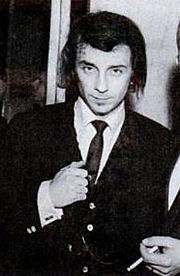
Phil Spector was a huge influence on Brian. In 1966, Brian called Spector "the single most influential producer." He admired Spector's way of treating "the song as one giant instrument," creating a huge, spacious sound. When he heard the Ronettes' 1963 hit "Be My Baby" on the radio, he immediately pulled over and said it was the greatest record he had ever heard. Brian often attended Spector's recording sessions and asked him about his production methods.
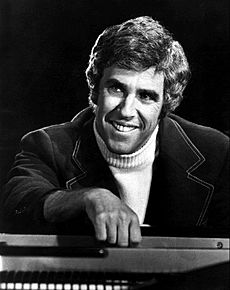
When asked about songs he wished he had written, Brian listed "You've Lost That Lovin' Feelin'", "Be My Baby", and Burt Bacharach's "Here I Am". Brian named Bacharach, along with Spector and Chuck Berry, as his main influences for chords. He said Bacharach had a "profound" influence that "got me going in a direction." Brian produced versions of Bacharach's "My Little Red Book" and "Walk On By" in 1967 and 1968, but they were not released.
Other Influences
Brian was also influenced by Frankie Valli and the Four Seasons, Nelson Riddle, the Motown sound, Disney film soundtracks like Mary Poppins (1964), and soul musicians such as Smokey Robinson and Stevie Wonder. Wendy Carlos's 1969 album Switched-On Bach influenced his use of synthesizers.
It is often said that the Beach Boys and the Beatles influenced each other, but Brian disagreed. He admitted that he felt challenged by the Beatles' success and that this pushed him to try to outdo them in the studio. He praised Paul McCartney's bass playing as "technically fantastic."
In 1976, Brian felt that modern popular music lacked artistic quality, with Queen's "Bohemian Rhapsody" (1975) being an exception. In a 1988 interview, he named Stevie Wonder's Original Musiquarium I and Paul Simon's Graceland among his favorite albums. In 2007, he named Billy Joel as his favorite pianist. By 2015, Brian said he only listened to "oldies but goodies."
Artistry
How He Wrote Songs
Brian described his songwriting process in 1966 as starting with a basic chord pattern and rhythm, which he called "feels." He explained, "Once they're out of my head and into the open air, I can see them and touch them firmly." He wanted to write songs that seemed "simple, no matter how complex it really is."
Brian often used jazz chords, like sevenths and ninths. He also used chord inversions, especially those with a tonic and a fifth in the bass. Sudden breaks into a cappella (singing without instruments) parts, like in "Salt Lake City" (1965) and "Sloop John B" (1966), were also common.
Many of Brian's songs have changing musical centers. He often changed keys within verses and choruses to create dynamic shifts. His bass parts are often melodic and stand out in his arrangements. He also used chromaticism (using notes outside the main scale).
Lyrics and Themes
Brian usually worked with another lyricist, but sometimes he wrote both the words and music himself. Most of his songs explored personal themes. Some songs showed the male character as a "loser," like "She Knows Me Too Well" and "Don't Hurt My Little Sister". Other common themes in his songs included youthful innocence, everyday stories, and health and fitness.
Although the Beach Boys were known for surfing songs, Brian's songs with other collaborators usually avoided this topic. Unlike other artists of his time, he never mentioned social issues in his lyrics. One writer described Brian as the "Carl Sandburg and Robert Frost of popular music" because his lyrics were simple but meaningful.
Studios and Musicians
Brian said he learned to think like a producer after studying Phil Spector's work. He often went to Spector's recording sessions to learn his techniques. Brian used Spector's choice of studios and session musicians, who were later known as the Wrecking Crew. Brian would plan about one-third of a song's arrangement while writing it, and the rest would be developed in the studio.
Brian preferred Studio 3 at Western for its privacy and the engineer Chuck Britz. Brian would make many adjustments to the recording setup, even directing musicians from the control booth. Britz said Brian would work with the musicians for hours until he got the sound he wanted.
Brian first used the Wrecking Crew for productions with the Honeys in March 1963. He gradually started using these musicians for Beach Boys records. By 1965, his sessions needed 11 or more different players, so he relied more on the Wrecking Crew. In 1966 and 1967, he almost only used these musicians for the music tracks.
His musicians, many of whom were trained in music schools, were impressed by his abilities. Bassist Carol Kaye said the group "were in awe of Brian." Drummer Hal Blaine said that all the musicians "helped arrange."
Production Style
Brian's most famous productions often used instruments like saxophones and bass harmonicas. He usually told his drummer to play only the snare and floor-tom afterbeats, similar to Spector's records. He rarely used ride or crash cymbals and often combined different instrument sounds to create new effects. He also recorded two echo chambers at the same time and had different bass instruments play the same parts.
His first use of a string section was in mid-1963. Before Pet Sounds, he usually added string instruments after recording the main music track, followed by vocal overdubs. Starting in 1963, he double-tracked the vocals, which made them sound fuller.
Starting in 1964, Brian used tape splices (cutting and joining tape) in his recordings, often to make difficult vocal parts easier for the group. By 1965, he became more experimental with tape splicing. These experiments led to the complex editing used for "Good Vibrations" and Smile. Mark Linett, who engineered Brian's recordings from the 1980s, said, "He certainly wasn't the first person to do edits, but it was unusual to record a song in four or five sections, and then cut it together."
Brian said that after his first nervous breakdown in 1964, he tried to use what he learned from Phil Spector and expand his use of instruments. One writer said Brian changed Spector's "Wall of Sound" techniques to create "audio clarity" and a "more lush, comfortable feel."
Singing Style
Brian's singing style was shaped by studying the Four Freshmen. He developed a versatile head voice that allowed him to hit high notes without using falsetto, though he did use falsetto on some Beach Boys songs. He learned to sing falsetto by listening to the Four Freshmen. Rosemary Clooney also influenced his singing; he learned "to sing with feeling" by copying her phrasing.
Initially, Brian had a clear tenor voice. Later in life, he rarely used this range. After the early 1970s, his voice changed. In a 1999 interview, Brian compared his style to Bob Dylan's "harsh, raspy voice."
Health and Personal Life
Health Challenges
Brian experienced auditory hallucinations (hearing voices) regularly from 1965 onwards. He called the voices "heroes and villains" that made his life scary.
His family and friends sometimes found it hard to tell if his health issues were genuine or if he was being difficult. After his flight incident in December 1964, his wife Marilyn arranged his first visit to a psychiatrist, who said his condition was due to work-related tiredness. Brian usually refused counseling.
Brian later said that his health struggles worsened after his first time using certain substances. His hallucinations started about a week after this. His wife Marilyn said he returned home the next day and kept saying his "mind was blown."
As Brian's condition worsened, he became prone to paranoid delusions, believing that his auditory hallucinations were "Satan coming in the form of other people that were competing with me and had ideas of killing me." By 1968, Marilyn's concerns about Brian's mental health grew. Brian was hospitalized later that year and given medication for severe anxiety disorder.
After His Health Program
Brian's mental condition improved in later years, though his auditory hallucinations continued, especially when performing. He credited his relationship with his second wife for helping him restart his music career. In his own words, he said that he should have spent the early 2000s "in a mental institution under heavy sedation" due to the stresses of his condition. However, he said, "Things have started to get a little bit easier, but I'm not always in a positive, happy place." In 2002, he felt that his successful treatment had affected his creativity and songwriting.
Personal Life
Hearing Loss
At age 11, Brian was found to have significantly reduced hearing in his right ear. The exact cause is not clear. Because of this, Brian developed a habit of speaking from the side of his mouth. He also experienced tinnitus (ringing in the ears). In the late 1960s, he had surgery that did not restore his hearing.
Relationships and Family
Brian's first serious relationship was with Judy Bowles, whom he met in mid-1961. She inspired his songs "Judy" (1962), "Surfer Girl" (1963), and possibly "The Warmth of the Sun" (1964). Around that time, he started a relationship with singer Marilyn Rovell, whom he met in August 1962.
Brian and Marilyn married in December 1964. They had two daughters, Carnie and Wendy (born 1968 and 1969), who later became successful musicians as part of the group Wilson Phillips. His daughters inspired his songs "Roller Skating Child" (1977) and "Little Children" (1988).
Much of the lyrics from Pet Sounds reflected early difficulties in his marriage. Brian later said he was not always a good father and husband during his first marriage.
In July 1978, Brian and Marilyn separated, and he filed for divorce in January 1979. Marilyn received custody of their children and a share of Brian's songwriting royalties.
Brian first dated Melinda Kae Ledbetter from 1986 to late 1989. They reconnected after 1991 and married on February 6, 1995. Melinda became Brian's manager. They adopted five children. By 2012, Brian had six grandchildren. Melinda passed away on January 30, 2024. Brian said she "was my savior. She gave me the emotional security I needed to have a career."
Beliefs
Brian was raised in a Presbyterian family. In many interviews, he talked about the spiritual side of his music, especially with Pet Sounds. He was also interested in astrology, numerology, and the occult, which influenced his ideas for Smile. In 1966, Brian said he believed all music "starts with religion."
In the late 1960s, Brian and his bandmates promoted Transcendental Meditation (TM). By 1968, he connected religion and meditation, though he eventually stopped practicing TM.
In 2011, he said that while he had spiritual beliefs, he did not follow any specific religion. When asked in 2004 about his favorite book, Brian answered "the Bible."
Public Statements and Memoirs
Brian admitted to having a poor memory and sometimes not telling the full truth in interviews. One writer noted in 2000 that Brian's "public statements over time have tended to reiterate those of whoever's supervising his activities at the moment."
In October 1991, Brian published his first memoir, Wouldn't It Be Nice: My Own Story. This book was later criticized for using parts from earlier biographies. The memoir led to lawsuits from Mike Love and Al Jardine, as well as his brother Carl and their mother Audree.
In later years, many writers found Brian difficult to interview because his answers were often short or lacked detail. He often ended interviews suddenly. A second memoir, I Am Brian Wilson, written by journalist Ben Greenman after several months of interviews, was published in October 2015.
Cultural Impact and Influence
Sales Achievements
From 1962 to 1979, Brian wrote or co-wrote over twenty U.S. top 40 hits for the Beach Boys. Eleven of these reached the top 10, including the number-ones "I Get Around" (1964), "Help Me, Rhonda" (1965), and "Good Vibrations" (1966). Three more songs he produced, but did not write, were "Barbara Ann" (number 2) in 1965, "Sloop John B" (number 3) in 1966, and "Rock and Roll Music" (number 5) in 1976. Among his other top 10 hits, Brian co-wrote Jan and Dean's "Surf City" (the first chart-topping surf song) and "Dead Man's Curve" (number 8) in 1963, and the Hondells' "Little Honda" (number 9) in 1964.
Music Industry and Production
Brian is widely seen as one of the most creative and important songwriters of the late 20th century. Many of his fellow musicians considered him one of the most significant artists in popular music. Composers like Philip Glass and Burt Bacharach praised Brian as "one of the greatest innovators" in music history.
Brian's level of creative control over his music was new in the music industry. He became one of the first pop artists credited for writing, arranging, producing, and performing his own material. Brian's artistic freedom was key in changing popular music and how the music industry viewed artistic control.
Brian was also one of the first music producer auteurs (producers with a strong personal vision). He helped make the idea of the recording studio as a compositional tool popular. He was the first rock producer to use the studio in this way. One writer said Brian "redefined" the role of the producer.

Beatles producer George Martin said, "No one made a greater impact on the Beatles than Brian." Jimmy Webb explained, "As far as a major, modern producer who was working right in the middle of the pop milieu, no one was doing what Brian was doing." David Crosby called Brian "the most highly regarded pop musician in America."
Brian's achievements as a producer influenced many others, setting a standard that allowed other bands and artists to produce their own recordings. After he showed total creative freedom, many similar producers emerged in California. Brian was also a pioneer of "project" recording, where an artist records by himself rather than at a big studio.
The 1967 CBS documentary Inside Pop: The Rock Revolution called Brian "one of today's most important pop musicians." Artists who have called Brian a "genius" include George Martin, Leon Russell, Eric Clapton, Pete Townshend, Jimmy Page, Elton John, Tom Petty, and Questlove. Many other musicians have admired Brian's work or said it influenced them, including Bob Dylan, Neil Young, Paul McCartney, and Bruce Springsteen.
Art Pop, Psychedelia, and Progressive Music
Brian helped develop the mid-1960s art pop movement with his new musical sounds and use of symphonic orchestras. With Pet Sounds, he was immediately seen as a leading figure in art rock. One writer said Brian created an "art-rock" style that combined artistic possibilities with mainstream pop appeal.
Under Brian's creative leadership, the Beach Boys played a big role in developing psychedelic music, even though they are not always recognized for it. One book credits Brian, along with Bob Dylan and the Beatles, for setting a creative standard that allowed psychedelic artists to expand their musical boundaries.
Brian's work with the Beach Boys, especially on Pet Sounds, "Good Vibrations," and Smile, marked the beginning of progressive pop. This genre is known for its complex and unusual approaches to pop music. One writer identified Brian's 1960s productions as a main influence on bands like Queen, Electric Light Orchestra, and Crosby, Stills, Nash & Young.
Brian's choice to step back from live performances and use bandmates as "attractive avatars" predicted later producer-musicians. One writer credits Pet Sounds with inventing "the modern pop album" by establishing producer-driven music, anticipating "the rise of the producer [and] the modern pop-centric era."
Alternative Music and Lasting Influence
Brian has also been called the "godfather" of punk, indie rock, and emo. His early records, along with Mike Love's contributions, were a key influence on the development of punk rock and its evolution into indie rock. For example, The Ramones took inspiration from Brian's early style.
Later in the 20th century, Brian was credited with inspiring an era of independently produced music. This music was heavily influenced by his melodies, chamber pop orchestrations, and recording experiments. Brian is also credited with pioneering the "approach to the sheer physicality of sound" in popular music, which is important to the dream pop genre.
Newer artists influenced by Brian include Robyn Hitchcock, Redd Kross, the Church, and Lana Del Rey. In Japan, references to Brian and his "mad boy genius" legend became common among Shibuya-kei musicians. In 2000, Marina Records released Caroline Now!, an album of Brian's songs recorded by various artists.
Many popular artists of the 1980s and 1990s recorded songs that celebrated or referenced Brian's music, including R.E.M., Bruce Springsteen, Barenaked Ladies, and Wilco. Through artists like Panda Bear, Brian continued to be recognized for his impact on indie music. In 2009, Pitchfork magazine connected the development of new indie music scenes to the themes of Brian's songs and his reputation.
Brian's influence continues to be seen in modern dream pop acts. In 2022, She & Him released Melt Away: A Tribute to Brian Wilson and went on a concert tour dedicated to his songs.
Documentary Films
- Brian Wilson: I Just Wasn't Made for These Times, directed by Don Was, premiered in January 1995. It features new interviews with Brian and many other musicians who discuss his life and music.
- Beautiful Dreamer: Brian Wilson and the Story of Smile, directed by David Leaf, premiered in October 2004. It includes interviews with Brian and many of his associates.
- Brian Wilson: Long Promised Road, directed by Brent Wilson, premiered in June 2021. It focuses on the last two decades of Brian's life, with appearances from Bruce Springsteen, Elton John, and Jakob Dylan.
Awards and Honors
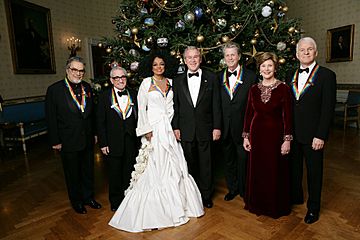
- Nine-time Grammy Award nominee, two-time winner.
| Organizations | Year | Award | Result | |
|---|---|---|---|---|
| Grammy Awards | 2005 | Best Rock Instrumental Performance for "Mrs. O'Leary's Cow" | Won | |
| 2013 | Best Historical Album for The Smile Sessions | Won | ||
| Hollywood Walk of Fame | 1980 | As a member of the Beach Boys | Honored | |
| Rock and Roll Hall of Fame | 1988 | As a member of the Beach Boys | Honored | |
| Primetime Emmy Award | 1996 | Outstanding Cultural Music-Dance Program for Brian Wilson: I Just Wasn't Made For These Times |
Nominated | |
| Songwriters Hall of Fame | 2000 | inducted by Paul McCartney | Honored | |
| Ivor Novello International Award | 2003 | For his contributions to popular music | Honored | |
| Northeastern University | 2003 | Honorary doctorate of music | Honored | |
| Broadcast Music Incorporated | 2004 | BMI Icon Awards | Honored | |
| MusiCares Person of the Year | 2005 | for his artistic and philanthropic accomplishments | Honored | |
| UK Music Hall of Fame | 2006 | Inducted by Pink Floyd guitarist David Gilmour | Honored | |
| Hollywood Bowl Hall of Fame | 2007 | Induction | Honored | |
| Kennedy Center Honors | 2007 | Medal | Honored | |
| American Academy of Achievement | 2008 | Golden Plate Award | Honored | |
| UCLA | 2011 | George and Ira Gershwin Award at UCLA Spring Sing | Honored | |
| Golden Globe Award | 2015 | Best Original Song for "One Kind of Love" from Love & Mercy | Nominated |
Polls and Critics' Rankings
| Organizations | Year | Notes | |
|---|---|---|---|
| NME | 1966 | Wilson was ranked number four in "World Music Personality" reader's poll. | |
| Rolling Stone | 2008 | Wilson was ranked number 52 in list of the "100 Greatest Singers of All Time". | |
| NME | 2012 | Wilson was ranked number eight in list of the "50 Greatest Producers Ever". | |
| Rolling Stone | 2015 | Wilson was ranked number 12 in the list of the "100 Greatest Songwriters of All Time". | |
| Rolling Stone | 2020 | Brian Wilson Presents Smile was ranked number 399 on the list of "The 500 Greatest Albums of All Time". | |
| Ultimate Classic Rock | 2022 | Wilson was ranked second in the list of the best producers in rock history. | |
| Rolling Stone | 2023 | Wilson was ranked number 57 in the list of the "200 Greatest Singers of All Time". |
Discography
- Brian Wilson (1988)
- I Just Wasn't Made for These Times (1995) (soundtrack)
- Orange Crate Art (1995) (with Van Dyke Parks)
- Imagination (1998)
- Gettin' In over My Head (2004)
- Brian Wilson Presents Smile (2004)
- What I Really Want for Christmas (2005)
- That Lucky Old Sun (2008)
- Brian Wilson Reimagines Gershwin (2010)
- In the Key of Disney (2011)
- No Pier Pressure (2015)
- At My Piano (2021)
- Brian Wilson: Long Promised Road (2021) (soundtrack)
Filmography
| Year | Title | Role | Notes | Ref |
|---|---|---|---|---|
| Film | ||||
| 1965 | The Girls on the Beach | himself (with the Beach Boys) | Beach comedy film | |
| 1965 | The Monkey's Uncle | himself (with the Beach Boys) | Beach comedy film | |
| 1987 | The Return of Bruno | himself | Mockumentary film | |
| 1994 | Theremin: An Electronic Odyssey | himself | Documentary | |
| 1995 | Brian Wilson: I Just Wasn't Made for These Times | himself | Documentary | |
| 2004 | Beautiful Dreamer: Brian Wilson and the Story of Smile | himself | Documentary | |
| 2006 | Tales of the Rat Fink | The Surfite (voice) | ||
| 2018 | Echo in the Canyon | himself | Documentary | |
| 2021 | Brian Wilson: Long Promised Road | himself | Documentary | |
| 2024 | The Beach Boys | himself | Documentary | |
| Television | ||||
| 1967 | Inside Pop: The Rock Revolution | himself | Television movie | |
| 1988 | The New Leave It to Beaver | Mr. Hawthorne | Episode: "Day Dreamin'" | |
| 1988 | Full House | himself (with the Beach Boys) | Episode: "Beach Boy Bingo" | |
| 1995 | Baywatch | himself (with the Beach Boys) | Episode: "Surf's Up" | |
| 2005 | Duck Dodgers | himself (voice) | Episode: "Surf the Stars" | |
See also
 In Spanish: Brian Wilson para niños
In Spanish: Brian Wilson para niños
- List of people with absolute pitch
- List of recluses
- List of unreleased songs recorded by the Beach Boys
- Pet Projects: The Brian Wilson Productions
- Playback: The Brian Wilson Anthology
 | Emma Amos |
 | Edward Mitchell Bannister |
 | Larry D. Alexander |
 | Ernie Barnes |


